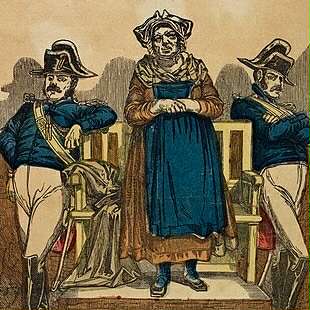
1803 - 1852
Hélène Jégado
Summary
Name:
Years Active:
1833 - 1851Birth:
June 17, 1803Status:
ExecutedClass:
Serial KillerVictims:
23+Method:
PoisoningDeath:
February 26, 1852Nationality:
France
1803 - 1852
Hélène Jégado
Summary: Serial Killer
Name:
Hélène JégadoStatus:
ExecutedVictims:
23+Method:
PoisoningNationality:
FranceBirth:
June 17, 1803Death:
February 26, 1852Years Active:
1833 - 1851Date Convicted:
December 14, 1851bio
Hélène Jégado was born on 17 June 1803 on a small farm in Plouhinec (Morbihan), Brittany, near the port city of Lorient. She lost her mother at the age of seven and was sent to live with two aunts who worked as servants at the rectory of Bubry. Growing up in a household of domestic laborers, she became familiar with housekeeping and kitchen work at an early age. For seventeen years she remained in Bubry, then followed one of her aunts to the town of Séglien, where she became cook for a local priest.
From early on, Jégado displayed troubling behavior. In one incident, she was accused of adding hemp from a grain house into her employer’s soup. Nevertheless, she cultivated a reputation for piety and sorrow, which made her appear above suspicion. Her life was marked by frequent changes of employment, moving from parish to parish across Brittany, and later into cities such as Lorient, Pontivy, Port‑Louis, and finally Rennes. She also exhibited kleptomaniac tendencies, being caught for theft several times.
Psychologists examining the case retrospectively have suggested that her crimes may stem from psychological disturbances originating in childhood. Losing her mother young and enduring a life of servitude may have contributed to abandonment issues or what modern clinicians might call “abandoned child syndrome.” Jégado herself reportedly said that killing gave her a “sense of power,” an unusual admission for a 19th‑century female domestic worker.
murder story
Jégado’s first suspected killings occurred between 28 June and 3 October 1833 while she was employed by Fr. François Le Drogo in Guern, Brittany. In just over three months, seven members of the household—including the priest, his elderly parents, and Jégado’s own visiting sister Anne—died suddenly. Because the region had recently endured a cholera epidemic (1832), the deaths were attributed to natural causes, and Jégado’s outward display of grief shielded her from suspicion.
Returning to Bubry, she replaced her dead sister as servant and again three more people died under her care. She relocated to Locminé, boarding with a needleworker named Marie‑Jeanne Leboucher. Leboucher and her daughter soon died, and only the son survived, reportedly because he refused Jégado’s ministrations. Soon after, the widow Lorey, who had offered Jégado a room, died after eating a soup prepared by her new boarder. In May 1835, Jégado was hired by Madame Toussaint, and four more deaths followed. By that time she had already placed at least 17 people in their graves.
Later in 1835, she joined a convent in Auray but was dismissed after incidents of vandalism and sacrilege. Over the next several years she took brief domestic posts in Auray, Pontivy, Lorient, and Port‑Louis; often someone fell ill or died shortly after she arrived. Among her most infamous early murders was that of a child, Marie Bréger, who died at the Château de Soye in Ploemeur in May 1841, exactly ten years before Jégado’s final arrest. Most victims displayed symptoms consistent with arsenic poisoning, though she was never caught with the substance in her possession.
There is a gap in suspected killings between late 1841 and 1849, though several employers later reported thefts. By 1849, Jégado had moved to Rennes, the capital of Brittany. There she joined the household staff of Théophile Bidard, a law professor at the University of Rennes. In 1850, servant Rose Tessier fell ill and died. In 1851, another maid, Rosalie Sarrazin, also died under similar circumstances. Because two doctors had tried to save Sarrazin, they persuaded her relatives to allow an autopsy. Jégado raised suspicion by proclaiming her innocence before anyone accused her. She was arrested on 1 July 1851.
Subsequent inquiries linked her to at least 23 suspected deaths by poisoning between 1833 and 1841, though French statute of limitations barred prosecution for older cases. The most reliable modern estimate places her total number of murders at about 36, making her one of the most prolific female serial killers in French history.